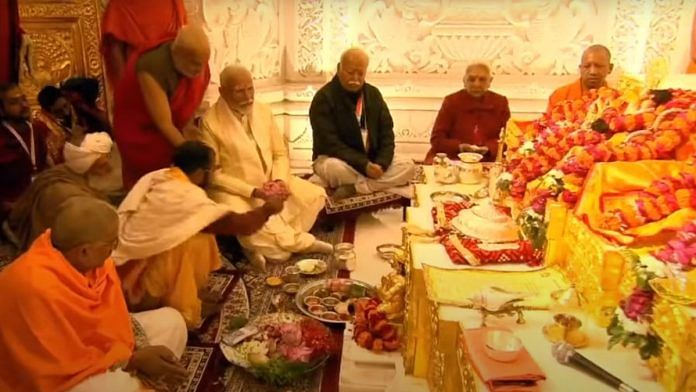News reports and stories about schism in the Rashtriya Swayamsevak Sangh (RSS) and the Bharatiya Janata Party (BJP) relations is not new, especially during Lok Sabha polls. Such stories, mostly figments of imagination, at times propagated with ulterior motives, appear without basis or are triggered by statements from the top leadership of either of the organisations. The current spate of such stories appears to be emanating from a statement made by BJP president JP Nadda. In response to a question on the relations between the BJP and the RSS, he reportedly said that the BJP as a party has grown and is capable of functioning independently, which in reality is true.
“Shuru mein hum aksham honge, thora kum honge, RSS ki zaroorat padti thi… Aaj hum badh gaye hain, saksham hai… toh BJP apne aap ko chalati hai,” he told The Indian Express in an interview..
Nowhere in his interview or his speeches does J P Nadda suggest that the BJP does not need the RSS or that the RSS is not supporting the BJP. A Swayamsevak of the RSS and a former top functionary of the Akhil Bharatiya Vidyarthi Parishad (ABVP) himself, Nadda only reiterated what the RSS top brass would have wished for the BJP—to grow on its own strength.
The strength of the BJP lies not only in its core ideology that reflects the RSS thought process or its millions of members today. As a political party, its strength is also measured by the number of its members in Parliament and the states it governs. India’s long and chequered seven-decade political history bears witness to the rise and fall of parties. A party’s ideology and programmes must reflect the hope, ambitions, and aspirations of the people if it wishes to survive in the political arena and not become like the Congress and Communist parties after losing mass-base support.
The BJP has rapidly widened its mass base and successfully established direct contact with all societal strata through its social engineering programmes, which the RSS has been doing through its shakhas for over nine decades. Thus, the BJP and the RSS have a coordinated approach towards achieving their respective goals without encroaching on each other’s domain. The RSS derives its strength not from the BJP’s parliamentary seats but from the number of shakhas and the steady, organic expansion of its influence.
Also read: RSS-BJP separation is official now. It’s been a long time coming under Modi decade
RSS has no complaints
One aspect of the BJP’s expansion through inducting defectors could be perceived by a small but significant RSS conservative section as a dilution or “deviation” from core principles. Almost all these new entrants have strong vote bank support due to their caste or nurturing of key voter constituencies. Their parties didn’t respect or recognise such leaders. Their political future is jeopardised if they don’t get tickets to contest and win, hence their migration. Most know they won’t be near the ideological core group in their new destination yet risk the change to gain political advantage.
Given the RSS’ dynamic management mechanism and live contacts with BJP decision-makers, such apprehensions are conveyed for effective course correction where necessary. Both organisations have their ears to the ground and are aware of the defectors’ strengths, weaknesses, and micro-management of constituencies to increase electoral strike rates.
Modi’s ability to micro-manage elections, set political agendas, and balance responsibilities as a full-time politician and prime minister with ease also results from his long RSS training and deep involvement in public life and electoral politics.
The RSS has steadfastly stayed away from electoral politics but not aloof from the political arena, though not as a player but an observer. After Independence and the tragic Partition followed by a ban (after MK Gandhi’s assassination, which was unconditionally lifted), there were attempts to persuade the RSS to merge with the Congress and strengthen it. Within the RSS too, there was intense debate on playing a political role alongside socio-cultural activities. But the RSS leadership prevailed over those suggesting concurrent political activity.
Yet, three years later, in 1951, the RSS lent support to the Bharatiya Jana Sangh (BJS) founded by Syama Prasad Mookerjee. Three decades later, in 1980, when the then Janata Party split on the dual membership issue, compelling the BJS group to quit and form the BJP, the RSS played a seminal role. Other than these two instances, the only other time when RSS swayamsevaks were asked to ensure the defeat of the Congress party led by Indira Gandhi was the 1977 elections during the infamous Emergency.
The RSS has always advocated for a strong government at the Centre, which can successfully face internal and external challenges and ensure the unity and integrity of the country. If it finds such a government in BJP under the leadership of its swayamsevak Narendra Modi, it has no reason to complain or not extend support to the government and its leader.
Seshadri Chari is the former editor of ‘Organiser’. He tweets @seshadrichari. Views are personal.
(Edited by Prashant)




My complaint about PM Modi is that he is doing disservice to free-market capitalism by following awkward RSS economics. There should be only two GST slabs, 5% and 10%. Over taxation of motor fuel to fund socialism should stop. The list is long. If textbook free-market economics is followed, India will become a developed country in a short span.